
THE United Nations (UN) is the centrepiece of what is touted as the rules-based international order. The entrenched biases in these rules are, however, laid bare by the composition and voting procedures of its most powerful organ, the Security Council. The Council was designed as an alliance of the permanent five to maintain international peace and security. But these powers became the biggest warmongers who reduced the Council to a showpiece by ensuring that it did not act against them or their protégés. Much worse, the Council became an instrument of their hegemony when, in the brief periods of their camaraderie, it authorised them to take military action on its behalf.
The blame for this lies essentially with the big three—the United States, Russia and China—who are aggressively trying to establish their dominance in world affairs. The United Kingdom and France, much diminished in military strength, play second fiddle to the US.
The UN was the second international organisation formed to provide security to the world. Its predecessor, the League of Nations, sandwiched between the two World Wars, had a fleeting existence. The UN has done little better in saving the world from the scourge of war, but it has one creditable achievement—it has survived. Its main founding powers, the US, the Soviet Union and the United Kingdom, fell out soon after its formation and their collective security arrangement became unworkable. They could not agree on providing a military force to the Security Council under Article 43 of the UN Charter, leaving the newborn at their mercy for any military action.
This story is from the January 21, 2025 edition of Outlook.
Start your 7-day Magzter GOLD free trial to access thousands of curated premium stories, and 9,000+ magazines and newspapers.
Already a subscriber ? Sign In
This story is from the January 21, 2025 edition of Outlook.
Start your 7-day Magzter GOLD free trial to access thousands of curated premium stories, and 9,000+ magazines and newspapers.
Already a subscriber? Sign In
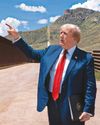
Nomadland
All eyes are on President-elect Donald Trump and his policy on immigration

Far from Home
We have forgotten the plight of Afghans who fled to India, and continue to suffer
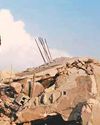
Bang Bang That Awful Sound
What happens when we listen closely to the soundscape of war?
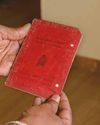
Refugee Dilemma
For most Indian-origin Sri Lankan Tamils, who are victims of ethnic conflict and civil war, proving that they are not illegal migrants is a nearly impossible task

They Poured Fire on Us
The resilience of refugee women from Sudan, Ethiopia and Yemen in the face of war and displacement is remarkable
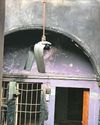
The Sound and the Fury
Iraqi poet, novelist, translator and scholar Sinan Antoon was born and raised in Baghdad.

The Day I Became a Woman
In a country where authorities have been directly engaging in the gruesome war against women for decades, artists like Nahid Hassanzadeh stand apart as a voice of dissent–a haunting reminder of the unwavering spirit of the rebellious Iranian women fighting against the Islamic Republic’s violent crackdown.

The Kite Runner
The official figure of civilian deaths in Afghanistan is a serious underestimate. It is unlikely that we will ever know the real cost of Afghan lives

American Patriot
Barring a few exceptions, Hollywood movies continue to be gung-ho about the United States' penchant for waging wars across the globe
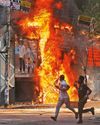
The Hunters
How can Bangladesh's fractured society, burdened by layers of trauma, begin to heal?
